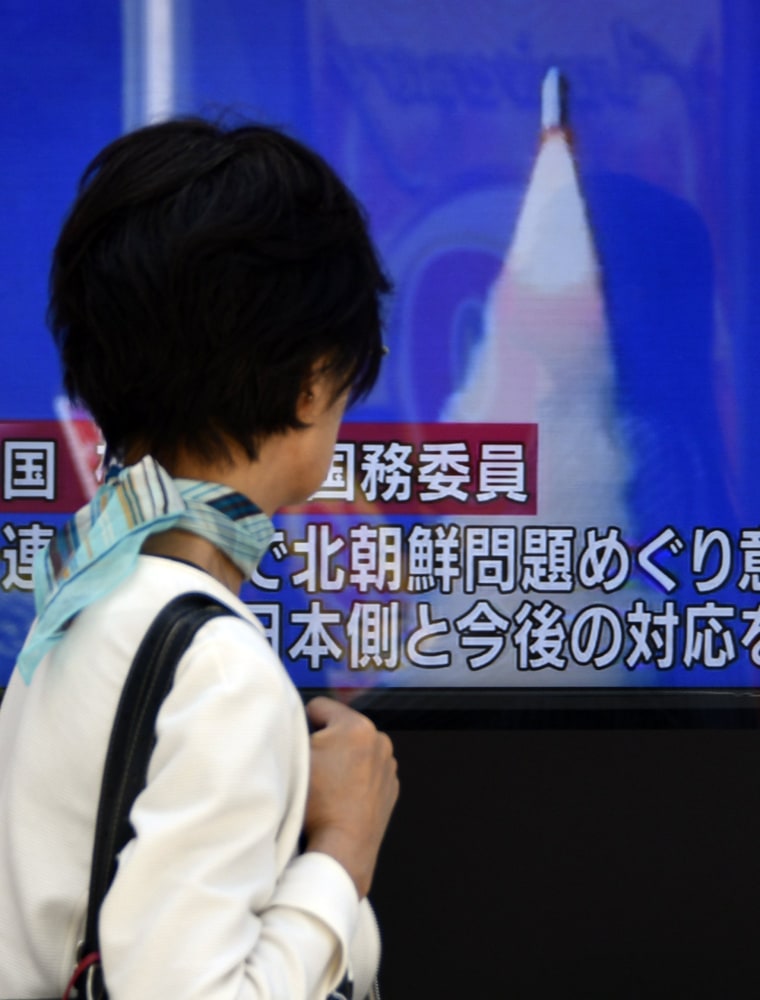TOKYO — The latest ballistic missile fired by Kim Jong Un's regime plunged into the Sea of Japan earlier this week.
Japanese Prime Minister Shinzo Abe has described such North Korean launches as a “grave threat to our country” and “absolutely not acceptable.”
But such warnings appear to be causing little concern on the streets of Tokyo.
“I don’t feel any threat, nor has it affected my daily life,” said Ryoji Nakajima, a 36-year-old office worker. It was a sentiment shared by several others approached by NBC News in the city's Ginza district.
While Kim's stated aim is to develop a nuclear-tipped intercontinental ballistic missile capable of striking the U.S. mainland, Japan is also home to some 54,000 U.S. military personnel. And North Korea has said it has military units positioned to strike.
North Korea can already strike anywhere in Japan with its missiles.
In March, Japan held its first civilian evacuation drill for a missile attack amid wariness over the military threat potentially posed by the hermit kingdom.
But Shunji Hiraiwa, an expert in North Korean diplomacy at Nanzan University in Nagoya City, said while many people in Japan “do feel a sense of danger ... I don’t think they feel that a war is imminent.”
That view was echoed by Narushige Michishita, a professor at the National Graduate Institute for Policy Studies in Tokyo.
“Fortunately, right now it’s not as if there’s a clear and present danger that is sending people into panic,” Michishita said.
However, he added that “people have started to understand that it might be possible for North Korea to obtain these capabilities.”
Pyongyang has launched a series of missiles as well as carrying out two nuclear tests since the beginning of 2016.
On Thursday, the Pentagon sent aircraft carriers the USS Carl Vinson and USS Ronald Reagan to the Sea of Japan for a three-day drill alongside Tokyo's navy and air force. It involved Japanese Air Self Defence Force F-15s taking part in simulated combat with U.S. Navy F-18 fighters as part of what was characterized by Tokyo as a "major exercise."
Secretary of State Rex Tillerson has declared America's era of strategic patience with North Korea over. He has also refused to take possibility of military action off the table.
North Korea has repeatedly rejected calls to curtail its nuclear and missile programs, calling them legitimate self-defense.
Michishita believes North Korea’s actions can be viewed as a broad strategy to secure its own future.
“It’s not very clear why North Korea has been conducting these missile tests in rapid succession. But one possibility is that it’s trying to gain the attention of the United States and to improve their bargaining position in the event of bringing the U.S. to the negotiating table,” Michishita said. “If you take a step back and look at the larger picture, the reason for this is that they’re trying to establish a deterrence in order to avoid a preventive attack from the United States."
Hiraiwa agreed. “The main objective is to negotiate with the United States by having them accept their present status and build a relationship based on that," he said.

Even if that is the case, however, the North Korea issue has raised questions about Japan's strictly defensive national security policy which has been in place since the end of the Second World War.
The Japan Times reported that Abe described Pyongyang’s growing military capabilities as presenting “a new level of threat” after three other North Korean missiles landed in the Sea of Japan in March.
Hiraiwa says he thinks Abe’s choice of words show he believes that “North Korea’s threat level is starting to rise faster than the pace of Japan’s defense capabilities.”
But on the streets of Tokyo, one woman seemed more concerned about how Monday’s launch might impact on her looming vacation.
Tsuyuko Tanaka, 69, said she was planning to go on a cruise that would pass through the area where the latest missile landed — which was in international waters but within Japan's exclusive economic zone.
“The best would be to resolve through dialogue, but I worry whether the North Koreans would listen,” Tanaka said.
Arata Yamamoto reported from Tokyo. Eoghan Macguire reported from London.